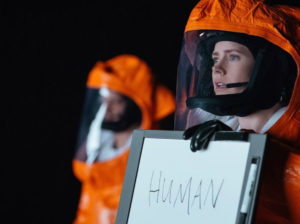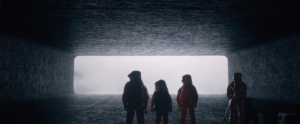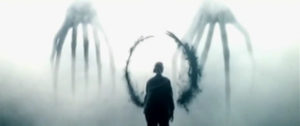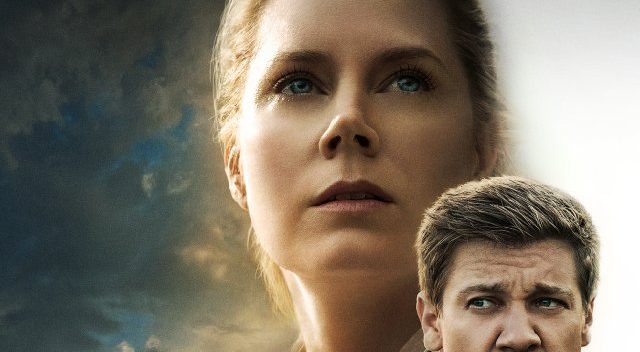Don’t expect much. Expect very little, in fact…
Do, however, expect computer generated imagery; wooden characters; emotional set-ups without the resolution one expects from well conceived plots; a muddled, irresolute ending; and the occasional not-so-well-veiled political jab. Miss Pritchard is tempted to use a non-linear critique in this non-linear film to give you a taste of the over-arching plot mechanism; but, that would muddy the waters too much and her reputation for impeccable English would be sullied beyond redemption: Arrival (2016; PG-13; Denis Villeneuve, director) (link to IMDb). For a plot summary…click here. (Please note this review contains spoilers.)
Let us get down to brass tacks. Arrival is a long, politically correct and tendentious homage to the cinematic art of self-indulgence. From the get-go, viewers should be alert to gratuitous emotional manipulation with a sick child whom we never actually get to know. In essence, the child is without personality and works as a foil for her mother’s perfunctory psycho-drama. When nothing else comes to the screenwriter’s mind (screenwriter, Eric Heisserer – A Nightmare on Elm Street), put a kid – any kid – in mortal danger, assume emotional devastation in the parents, and work from there. Of course, the child’s illness is terminal and presented as something that can’t be pinned on anything or anybody except an unfeeling and indifferent universe. Yet can it? Not to worry, in the topsy-turvy world created by Arrival, not even premature death registers any emotional depth. Can’t achieve any degree of gravitas with the death of a child? Very well then…put the entire planet in danger too! Maybe that will elevate the needle on the cinematic drama meter. Alas, no. The World-in-peril doesn’t register much either.
 Arrival seems to have been cobbled together from many other films; a cinematic element from this movie here and a dramatic moment from another there. Unfortunately, the whole does not work from the parts. Besides the previously mentioned non-linear format, the other mechanism in use is what Miss Pritchard calls the “many plot elements in the air all at once and wait for the final few minutes for resolution” style of story-telling. Other films employing this picture-puzzle framing include Adaptation (2002) and Barton Fink (1991). Both of these films deal with the creative process and what artists go through psychologically and emotionally to give birth, as it were, to their works of art. Both films involve a protagonist with creative block struggling with their creative forces which manifest in odd and unexpected ways. Each protagonist confronts whatever bedevils their emotive juices and arrives at satisfying dramatic and psychological fulfillment. While thematically similar, the story-telling is so varied each to the other, the films stand on their own. In other words, the roads taken are so varied as to make an interesting journey even though the final destination is similar.
Arrival seems to have been cobbled together from many other films; a cinematic element from this movie here and a dramatic moment from another there. Unfortunately, the whole does not work from the parts. Besides the previously mentioned non-linear format, the other mechanism in use is what Miss Pritchard calls the “many plot elements in the air all at once and wait for the final few minutes for resolution” style of story-telling. Other films employing this picture-puzzle framing include Adaptation (2002) and Barton Fink (1991). Both of these films deal with the creative process and what artists go through psychologically and emotionally to give birth, as it were, to their works of art. Both films involve a protagonist with creative block struggling with their creative forces which manifest in odd and unexpected ways. Each protagonist confronts whatever bedevils their emotive juices and arrives at satisfying dramatic and psychological fulfillment. While thematically similar, the story-telling is so varied each to the other, the films stand on their own. In other words, the roads taken are so varied as to make an interesting journey even though the final destination is similar.
Elements pillaged from other films would be the…
- Communal Kumbaya spirituality from The Day the Earth Stood Still (1951).
- The world working together to a common purpose in Pacific Rim (2013).
- Audience alerted to a different physics by characters in an altered gravity from 2001: A Space Odyssey (1968).
- World on the brink of destruction in War of the Worlds (1953).
- First encounter in Close Encounters of the Third Kind (1977).
- Non-linear time line in Memento (2000).
(By the way, Miss Pritchard recommends all of these.)
 While Adaptation and Barton Fink deal with the creative process, Arrival deals in the procreative. Indeed. Arrival is ultimately about the emotional entanglement involved with having children. Or, rather, it’s supposed to be about the emotional entanglement associated with having children. The treatment in Arrival is so superficial and cursory it’s hard to generate any empathy for Louise or her decision to have a child knowing full well, tragedy lies ahead. And, while we’re bending time and space, forget the feelings of the father. Forget the feelings of the child too. The father and the child’s feelings don’t register either with Louis or apparently the screenwriter. Nor is it supposed to register, apparently, since they’re scarcely touched on. This might be another politically correct element in the oh-so au courant zeitgeist of women going it alone with child bearing and rearing. We say might because Miss Pritchard is reluctant to give the writer credit for even that much self-awareness.
While Adaptation and Barton Fink deal with the creative process, Arrival deals in the procreative. Indeed. Arrival is ultimately about the emotional entanglement involved with having children. Or, rather, it’s supposed to be about the emotional entanglement associated with having children. The treatment in Arrival is so superficial and cursory it’s hard to generate any empathy for Louise or her decision to have a child knowing full well, tragedy lies ahead. And, while we’re bending time and space, forget the feelings of the father. Forget the feelings of the child too. The father and the child’s feelings don’t register either with Louis or apparently the screenwriter. Nor is it supposed to register, apparently, since they’re scarcely touched on. This might be another politically correct element in the oh-so au courant zeitgeist of women going it alone with child bearing and rearing. We say might because Miss Pritchard is reluctant to give the writer credit for even that much self-awareness.
Forget the space aliens. Forget seeing all of time laid out in front you. Forget the non-linear plot line. The movie isn’t science fiction. It’s a half baked morality play built around a flimsy structure with a sciency backdrop. The bending of time is invoked as an emotional get-out-of-jail-free card for the self-involved mother and protagonist Louise. Her side-kick, Ian, is a theoretical physicist who does little theorizing and has the thematic function of a door-stop. Also, Louise the linguist takes a very long time to arrive at even a basic form of communication with the alien visitors. Our linguist consultants and common experience tell us a basic understanding between two people with no common language would take a matter of minutes rather than hours as is presented in Arrival.
Political jabs come in the form of a not-so-well camouflaged Rush Limbaugh providing the political inspiration for a home-spun terror attack on the aliens nicknamed Abbott and Costello. In the spirit of full disclosure, Miss Pritchard abhors current political references in works of fiction. It functions like a dead-man’s switch in her mind. One can also assume the aliens would have equally superficial and dismissive pet-names for Louise and Ian too. Why wouldn’t they? As representatives of humanity, they leave a great deal to be desired. Miss Pritchard does give one positive nod to Forrest Whittaker as Colonel Weber for bringing a small degree of dignity to an otherwise limp and lifeless morality play.
As far as rating systems are concerned, Miss Pritchard does not use them. Feel free to employ your own scale utilizing fruits, vegetables, stars, points of light or what have you. Arrival deserves none.

